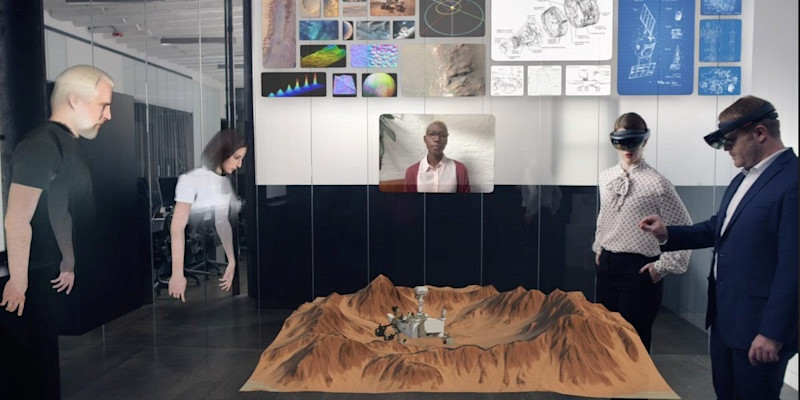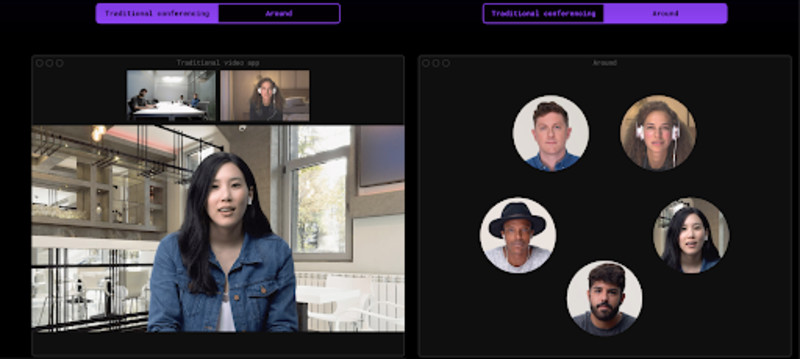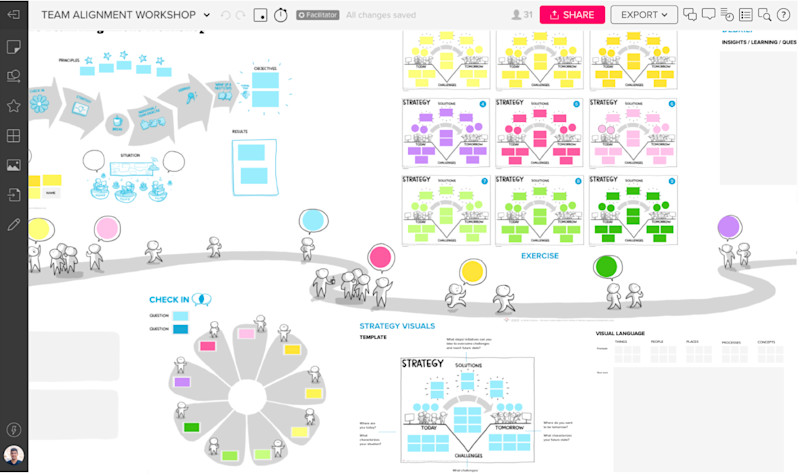Five Tech Startups Changing the Future of Remote Work
Table of contents
It took less than a month for remote work to go from a perk at a few tech companies to the lifeblood of the international business world. In the U.S. alone, close to 50% of employees worked from home during the COVID-19 shutdowns. So not only is the market suddenly very important, it’s also ripe for disruption. Here are five North American startups innovating new and interesting tools for remote work, all of which have received $25M or less in funding.

It took less than a month for remote work to go from a perk at a few tech companies to the lifeblood of the international business world. In the U.S. alone, close to worked from home during the COVID-19 shutdowns, and many of the largest companies in the country — including Google, Morgan Stanley, Twitter, and Facebook — have plans for more permanent remote work solutions even after the pandemic subsides.
This shift is also coming at a time when more companies are evaluating the racial and socioeconomic injustice in the American workforce. About one-third of early stage startups are based out of San Francisco, the city with the highest average rent in the United States. Hiring employees who already live in the Bay Area, or who can afford to, is definitionally limiting to the workforce. If companies can offer employment flexibility outside of the Bay Area, they can theoretically become more inclusive.
But even with all of this momentum shifting toward a more remote-heavy ecosystem, the tools for doing so are not quite there yet. Anyone who spends time on large video calls knows that the technology currently on the market is still not a perfect substitute for in-person meetings. Conversation can feel choppy and full of interruptions, while screen sharing can make collaboration feel very one sided and unproductive.
So not only is the market suddenly very important, it’s also ripe for disruption. Here are five North American startups innovating new and interesting tools for remote work, all of which have received $25M or less in funding.
Spatial

The feeling of sitting next to a coworker and openly brainstorming is extremely difficult to replicate through one fixed camera on a video conference. Even with a perfect connection, you’re still talking into a screen. It doesn’t feel completely natural.
But what if it did? How much could that change digital collaboration?
Spatial is trying to find out. The New York-based startup offers an augmented reality platform to help people feel like they are doing business in person. Users put on a virtual reality headset and use their personal avatar to move about a virtual meeting room, where they can talk, move, and interact with both their coworkers and everything else in the room. That means notes can be scribbled and ideas can be easily visualized, turning an individual’s home into a shared augmented workplace.
If the concept sounds a little nebulous, the is worth watching.
Founded in 2016 by Anand Agarawala, formerly at Google’s Creative Lab, and Jinha Lee, formerly in the visual display division at Samsung, Spatial already has customers like Mattel, BNP Paribas, Qualcomm, and Ford. The company has raised $22.3 million, including a in January that will allow it to build out functionality and compatibility with other platforms.
The latter could be crucial, as Spatial is the rare AR company that is not inherently tied to hardware. It works best with a VR headset, but users can also use the traditional video camera to join the virtual meeting room. This level of access could make it easier for Spatial to become a can’t-miss tool for a much wider range of companies.
Around

In a , a few days after his two-year old company, Around, raised a $5.2 million seed round, CEO Dominik Zane claimed that, “The basic design of a business video call hasn’t changed since Bell Labs demoed the Picturephone at the 1964 World’s Fair. It’s still essentially a telephone with a camera. Why is nothing changing? Because the UX has to be compatible with legacy room conferencing installations, TVs on walls, and expensive old-world accessories.”
The same month, Around its new video chat software. And it looks like nothing out of a World’s Fair.
Instead of wide-frame video calls that take up the entire screen, Around is able to crop participants down to just their heads. These well-framed circles float around the screen, allowing more space for other apps and windows. The software is designed specifically for laptops and uses auto-zoom to keep participant’s face in focus, not whatever room they happen to be sitting in. By clearing the screen from a lot of the unnecessary noise, users have more space to interact with the project itself, theoretically leading to a more cohesive and collaborative effort.
“People want to make eye contact,” Zane told TechCrunch. “They want to connect. But they also want to get stuff done. Around treats video as the means to an end, not the end in itself.”
Tehama

Of the many differences between a virtual office and a physical office, one of the biggest points of concern for large companies is security. Permanent remote work solutions are only viable if they’re as secure as the networks already in place, which is easier said than done when the current system supports thousands of employees and customers around the world.
The mission for Tehama, based out of Ottawa, Ontario, is to allow any company, anywhere in the world, to create secure and compliant cloud-based virtual offices, rooms, and desktops. The value proposition includes speed, as Tehama claims it is the fastest solution on the market for both deploying a virtual workforce and managing the scale of that team. No more shipping laptops and storing data in hard-to-access servers, which has allowed some of Tehama’s customers to cut down a process that sometimes takes into weeks into a few days.
Tehama’s founder and CEO is longtime Canadian entrepreneur Paul Vallée, who grew the business out of a successful IT company he also founded, Pythian. The company officially spun off in 2019 and now has more than 150 enterprises on the platform. Tehama also saw a 67% increase in usage in Q1 2020, according to Crunchbase, which helped it raise a $10 million Series A round in May.
“The world in May 2020 is radically different from the world in January 2020,” Vallée told Crunchbase. “There are dramatically more enterprises with the majority of their workforce working from home than there ever has been in the history of humanity.”
MURAL

MURAL, a digital workspace focused visual collaboration, has not had the typical startup path. After launching in San Francisco in 2011, the company raised less than $2 million over the next nine years. Instead of raising on growth potential, it focused on growing with its customers, building out more than 100 collaboration templates and other tools. MURAL signed IBM as a customer in 2014 and added other large companies over the years. By 2019, the team noticed that those customers were asking for more. The strategy was working. In January, MURAL raised its first large funding round with a $23 million Series A, putting itself in great position for the ensuing months of 2020.
Interestingly, the company was founded by three entrepreneurs — Agustin Soler, Mariano Suarez-Battan, and Patricio Jutard — who all have a background in video game design. As a result, MURAL was built for creativity and feels like an interactive whiteboard. Users can drag and drop ideas, input suggestions, and share information as if they are standing shoulder to shoulder in front of the same whiteboard.
This is the sort of non-linear, creative collaboration that allows for more innovation and out of the box ideas to emerge. By being built to integrate design thinking into remote work, not to fit creative and imaginative thinking into existing tools, teams are given more freedom to collaborate both synchronously and asynchronously.
MURAL is also a remote-first product built by a remote-first team. Headquartered in San Francisco and Buenos Aires, the company employs over 100 people across six time zones around the world.
Deel

Unless teams can easily and properly integrate international employees into their existing infrastructure, hiring global employees can be a logistical nightmare. Every country has different rules and regulations for payroll taxes and it can get really complicated really quickly.
San Francisco-based Deel makes it easy to hire and run payroll for all employees regardless of location. The company handles onboarding, payments, and compliance in one streamlined workflow for employees in more than 150 different countries. It can handle more than 100 currencies through 10 different payment methods and is backed by an extensive partner network of worldwide labor law experts. In short, it takes the complications out of hiring international employees. This allows founders in North America to spend time on the things they’re actually good at, not try and figure out the payroll compliance laws in India.
Deel was founded in 2018 by Alex Bouaziz and Shuo Wang. The next year it became a member of Y Combinator’s W19 batch and raised a $4.5 million seed round after graduating. By May 2020, it had raised a led by Andreessen Horowitz. Deel charges $35 a month per employee and can currently count more than 300 companies as customers. This is a business that seems directly tied to the remote work market — as companies begin to grow their international workforce, so will Deel.
--
The Org is a professional community where companies can show off their team to the world. Join your company here to add yourself to the org chart!


The �������� helps
you hire great
candidates
Free to use – try today